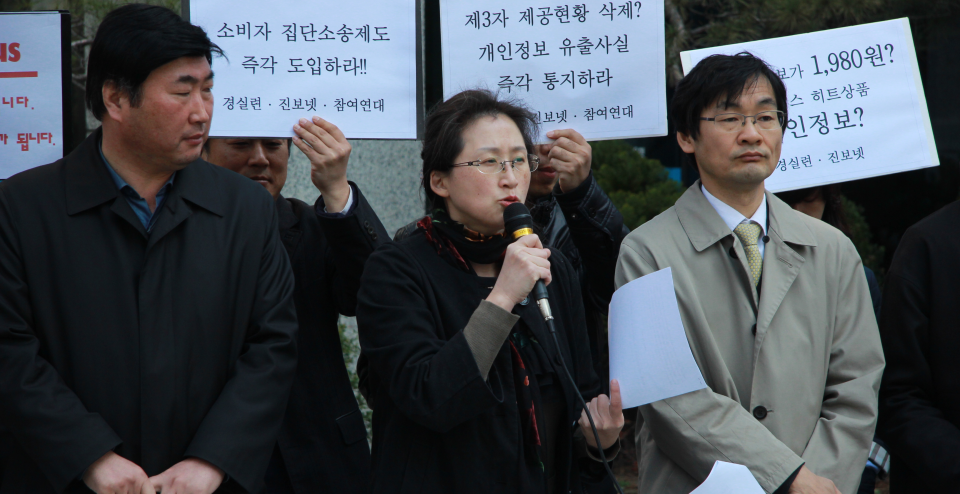
Image source: Y.K.Chang
Interview with Y.K. Chang who has recently been appointed as the Personal Information Protection Commission in South Korea - one of the first few women from civil society to reach this position within government in the country and possibly the region. GenderIT interviewed her on her journey, her ambitions for her new position and what she sees as the grave problems regarding privacy and security especially for women.
Namita Aavriti (NA): Tell us a bit about yourself, your years of working with and founding Jinbonet and also how you feel about this appointment?
Y.K. Chang (Della): Recently I left Jinbonet and started my work as an executive director of the Institute for Digital Rights, a Non-profit research Institute.
I have worked for Jinbonet as an activist since its inception in 1998. At that time, the opposition party took power for the first time in South Korea and there was a great desire for social reform. Many social movement groups needed help to use new information communication technologies (ICTs) for communication and solidarity. I myself was not a technician, but had been involved in the campaign against censorship on the internet and electronic ID card. In Jinbonet, I was responsible for ICT policy and coordinated work with other social movement groups and experts for advocating digital rights, and led many successful campaigns such as constitutional suit against government censorship , national ID number system, communication surveillance by investigative and intelligence agencies etc.
A candlelight protest of the people led to a new government after the former president was impeached last year. I was appointed as a non-standing commissioner of Korea data protection authority - officially Personal Information Protection Commission(PIPC) by the new government. It was very unusual for a civil society activist and a woman to be appointed as a commissioner, and this means that there is recognition of the role of civil society and their energetic activities. It shows positive change in political atmosphere under present government. I'm very proud of it.
It was very unusual for a civil society activist and a woman to be appointed as a commissioner, and this means that there is recognition of the role of civil society and their energetic activities. It shows positive change in political atmosphere under present government.

Candlelight protests in South Korea, December 2016: Source:Wikimedia Commons
NA: What are your concerns right now in relation to privacy and the rights of people in Korea?
Della: Currently there is a growing debate on constitutional amendment in Korea, and one of the issues is whether or not the "basic right of information" will be specified in the Constitution. I think that it is important to have guarantee of basic information rights including the right to privacy in the digital age in Korea.
Korea, which has undergone an authoritarian military dictatorship, has a very serious problem of surveillance by the state, especially the intelligence services and law enforcement agencies, which is getting worse with digitization.
Korea, which has undergone an authoritarian military dictatorship, has a very serious problem of surveillance by the state, especially the intelligence services and law enforcement agencies, which is getting worse with digitization. For example, the police collects 24 million records daily of car license plate from CCTV, input them into automatic recognition system and use them without any legal grounds. Also the National Intelligence Service has used the Deep Packet Inspection technology to intercept home, office, and mobile lines to monitor suspected violators of the National Security Act. Public interests such as national security, crime prevention and investigation are the grounds for supporting these activities of the government, and that why a declaration of the people's right to privacy in the digital age is very important here. Jinbonet and human rights groups have filed several constitutional complaints on communication surveillance, but the decision of the Constitutional Court has been delayed.
At the same time, companies establishing a business model based on big data processing of personal information have also been demanding the relaxation of the Personal Information Protection Act established by the demands of the Korean civil society in 2011. There are official requests to offer National Health Insurance information for sale to private companies. In such a situation, the activities of the PIPC, which advocates the value of the Personal Information Protection Act, are very important.

Source: Y.K.Chang
NA: What will your priorities be as commissioner of the South Korean national data protection authority: the Personal Information Protection Commission (PIPC)?
Della: As I told above, I’m mostly interested in protection of right to privacy from government surveillance and privacy in the digital age as a people's "constitutional right", which the ordinary customers, workers or patients have.
To do this job effectively, one of the most urgent task is to strengthen the independence and power of PIPC. Of course, the Personal Information Protection Act should be revised for that. There are several bills proposed in the national assembly to revise the Personal Information Protection Act for strengthening PIPC. I hope those bills could be passed as soon as possible.
NA: What about the independence and authority of the Commission? Is there room for them to be enhanced?
Della: As stipulated in international norms such as UN guideline or General Data Protection Regulation (GDPR), the independence and authority of data protection authority is essential to ensure the right to privacy, especially in the digital age, because it needs to supervise public institutions and government body. However, it is pointed out internationally that PIPC, as Korea's data protection authority, is lacking in its independence, because PIPC has no budgetary and personnel right of its own and its authority is limited. Currently main function of PIPC is to deliberate privacy-related policies, but it does not have authority to investigate and sanction.
At present, Korean Communication Commission(KCC), which is responsible for data protection on the internet, is trying to acquire “partial” adequacy decision on national laws and measures to ensure data protection from the European Commission ahead of the European GDPR's entry into force. This raised a lot of concern because the decision would be applied to only personal data on the internet, not personal data as a whole. The PIPC has issued an objection to that move, and argued that PIPC needs to be strengthened first to meet the “full” adequacy criteria.
The PIPC has argued that PIPC needs to be strengthened first to meet the “full” adequacy criteria of laws and other measures to ensure data protection under the European GPDR.

Image source: Y.K. Chang
NA: What role do you think gender or feminist perspective plays in internet rights, freedom of expression, protection of privacy, etc.?
Della: It is not easy to work as a working mom in Korea. I have been supported by my family and colleagues who recognized the issue and tried to change the organization’s culture. Identity as a woman makes me always be sensitive to social minorities.
Internet and digital technology have both sides. Victims of sexual violence call for social change as we have seen with #metoo campaign online, but they are often at risk of criminal prosecution for online defamation in Korea. On the other hand, hate speech against gender minorities and migrants are increasing in the name of freedom of expression. Digital technology is a great help for women's economic activities, but also women are often socially vulnerable or economically weaker and so could be targeted and included in big data without their informed consent. Many women often ask for installing CCTV on the street or nursery facilities, while this could be a problem regarding privacy of women workers’, many of whom belong to minority communities. I want to contribute to empower women in the digital age, as well as ensure their fundamental rights.
Internet and digital technology have both sides. I want to contribute to empower women in the digital age, as well as ensure their fundamental rights.
- 5114 views






Add new comment